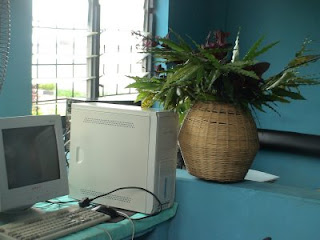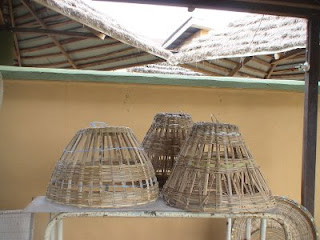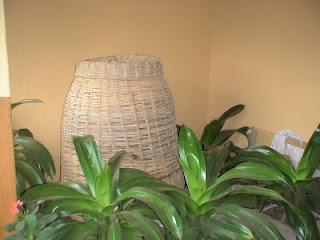SCULPTED BASKET PROJECT (an artist's development initiative project) + NEWS FROM HOME & AROUND TOWN ... Please Scroll Down ⬇
Search
Wednesday, October 29, 2008
End of Grant Era
The Terra Kulture Grant formerly came to an end on the 5th of September after several months of delay. However because I was at ARESUVA, I was unable to attend the exhibition in Lagos. I however read about it on the newspaper and got a little more information from fellow Grantee and Vitilago activist Ogo Maduewesi. Talking about Ogo, shes been such a help and has on many occasions bridged the distance between Nsukka and Lagos in such a manner that I can barely thank her enough, buttressing the Igbo adage that 'nwanne di na mba' it turned out that we were the igbo people in the grants list and 2 of the only three female while I was the only out-of Lagos artist who got the grant.
Monday, July 21, 2008
What about Common Baskets.
Local environment, local crafts
by Mrs Amuche Nnabueze
I live in Nsukka township, the central town in the Nsukka region in Enugu State, Nigeria. For more than three decades, I have watched with dismay as our environment deteriorates. I have watched waste products like plastic bags and other packaging cover our beautiful green landscape.
Most of us do not even realise the harm we are doing to ourselves, because no-one challenges us as we use and throw out this rubbish in the streets. These plastics are very cheap and there is no obvious effort to either stop or control this practice of ruining the landscape with this waste. It is not just a question of spoiling the view; the plastics block the waterways, which causes heavy erosion. Water gathers and provides a breeding ground for germs and insects which spread disease – this is reflected in the very high mortality rates in this area.
Disappearing skills

Photo: Tearfund
Another disturbing trend to contend with is the issue of our local crafts, one of which is basket-weaving. The traditional basket weavers are growing older and the younger generation have little interest in this traditional craft, since it is not included in any curriculum in the formal school system. I am worried that the tradition of basket-weaving will die away. These baskets are woven to different shapes and sizes, and used for carrying things and for storing palm kernels, cereals and kola nuts in the house. They are usually very beautiful and carefully crafted and they last a long time when preserved. Traditionally, these baskets are woven with materials collected from palm fronds which grow abundantly in this area. I see this as a very environmentally-friendly material to replace the plastic bags which litter the environment.
As an artist with an interest in the environment, I have a plan which I hope will go a long way to solving the problem of spoiling the environment with plastic waste and also address the gradual loss of a traditional craft skill. I want to start a campaign for the practice of waste separation, compost-making and, most importantly, the use of locally woven baskets in the place of plastic carrier bags and containers. This campaign will use all the local communication media available in Nsukka. One such medium is the opportunity provided by the tradition of a mourning house. In this area, when a person dies, the female members of the immediate and extended family all gather at the house of the deceased. They are expected to stay together in mourning for one to two weeks. Many ideas can be shared and developed there. I will also use posters, banners and leaflets.
I will organise a workshop for the best basket weavers from around Nsukka to introduce them to the new designs I have made. At the end of the workshop I will select the ten best basket makers and work with them for a period of one and a half months. I will then exhibit the products of the workshop and look for local and non-local clients. I will also seek to liaise with the environmental protection agency to have these baskets placed at strategic places, like bus stops and shopping centres, for the collection of waterproof and other light non-decomposing wastes which I will also use as materials for craft work.
Changing minds
I believe that the mass production and use of well-woven baskets will bring an amazing change in the mind-set of the younger generation and provide sustainable livelihoods for them. These baskets are a suitable tool for collecting light waste like plastics for proper disposal.
There is a local saying about ‘pouring water in a basket’ which suggests an effort that will yield nothing good. This is a metaphor for the present culture of greed and lack of concern for the future of our environment. However, I know that with a concerted effort, there can be a reversal in people’s attitude towards their own traditions, values and culture and the way we are treating our environment.
Mrs Amuche Nnabueze (née Ngwu)
Bishop Shanahan Hospital, PO Box 19, Nsukka, Enugu State, Nigeria.
They may be common but I think they are useful and should be treated as such - important - daily object. They are already very artistic in their natural appearances.
This is my article which was selected by Footsteps and it also emobidies the aims and objectives of Sculpted Basket Project. So far we have done some of the things we intended to do and we are hoping to do much more.
Do view the baskets below in earlier posts.
by Mrs Amuche Nnabueze
I live in Nsukka township, the central town in the Nsukka region in Enugu State, Nigeria. For more than three decades, I have watched with dismay as our environment deteriorates. I have watched waste products like plastic bags and other packaging cover our beautiful green landscape.
Most of us do not even realise the harm we are doing to ourselves, because no-one challenges us as we use and throw out this rubbish in the streets. These plastics are very cheap and there is no obvious effort to either stop or control this practice of ruining the landscape with this waste. It is not just a question of spoiling the view; the plastics block the waterways, which causes heavy erosion. Water gathers and provides a breeding ground for germs and insects which spread disease – this is reflected in the very high mortality rates in this area.
Disappearing skills

Photo: Tearfund
Another disturbing trend to contend with is the issue of our local crafts, one of which is basket-weaving. The traditional basket weavers are growing older and the younger generation have little interest in this traditional craft, since it is not included in any curriculum in the formal school system. I am worried that the tradition of basket-weaving will die away. These baskets are woven to different shapes and sizes, and used for carrying things and for storing palm kernels, cereals and kola nuts in the house. They are usually very beautiful and carefully crafted and they last a long time when preserved. Traditionally, these baskets are woven with materials collected from palm fronds which grow abundantly in this area. I see this as a very environmentally-friendly material to replace the plastic bags which litter the environment.
As an artist with an interest in the environment, I have a plan which I hope will go a long way to solving the problem of spoiling the environment with plastic waste and also address the gradual loss of a traditional craft skill. I want to start a campaign for the practice of waste separation, compost-making and, most importantly, the use of locally woven baskets in the place of plastic carrier bags and containers. This campaign will use all the local communication media available in Nsukka. One such medium is the opportunity provided by the tradition of a mourning house. In this area, when a person dies, the female members of the immediate and extended family all gather at the house of the deceased. They are expected to stay together in mourning for one to two weeks. Many ideas can be shared and developed there. I will also use posters, banners and leaflets.
I will organise a workshop for the best basket weavers from around Nsukka to introduce them to the new designs I have made. At the end of the workshop I will select the ten best basket makers and work with them for a period of one and a half months. I will then exhibit the products of the workshop and look for local and non-local clients. I will also seek to liaise with the environmental protection agency to have these baskets placed at strategic places, like bus stops and shopping centres, for the collection of waterproof and other light non-decomposing wastes which I will also use as materials for craft work.
Changing minds
I believe that the mass production and use of well-woven baskets will bring an amazing change in the mind-set of the younger generation and provide sustainable livelihoods for them. These baskets are a suitable tool for collecting light waste like plastics for proper disposal.
There is a local saying about ‘pouring water in a basket’ which suggests an effort that will yield nothing good. This is a metaphor for the present culture of greed and lack of concern for the future of our environment. However, I know that with a concerted effort, there can be a reversal in people’s attitude towards their own traditions, values and culture and the way we are treating our environment.
Mrs Amuche Nnabueze (née Ngwu)
Bishop Shanahan Hospital, PO Box 19, Nsukka, Enugu State, Nigeria.
They may be common but I think they are useful and should be treated as such - important - daily object. They are already very artistic in their natural appearances.
This is my article which was selected by Footsteps and it also emobidies the aims and objectives of Sculpted Basket Project. So far we have done some of the things we intended to do and we are hoping to do much more.
Do view the baskets below in earlier posts.
Saturday, July 5, 2008
Baskets Baskets and more Baskets From Nsukka
Subscribe to:
Posts (Atom)
Their Vision: Our Vision
We had loads of activities to make the year remarkable, we equally saw lots of challenges that will keep the year in our minds. SBP's C...
.jpg)
-
Nsukka of whom Chimamanda writes Nsukka home of the fearless writers nsukka home of the Igwebuike Onahs Azikiwes the Achebes...
-
You want a sneak peek into our back end?... see it here.... Hello World!













